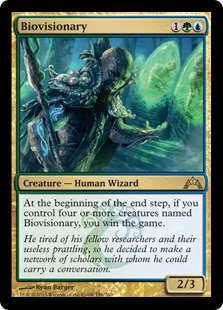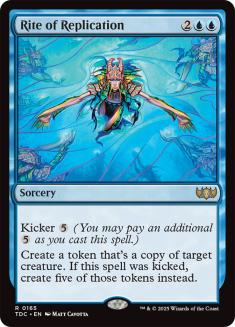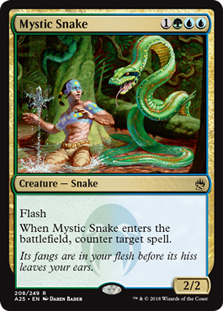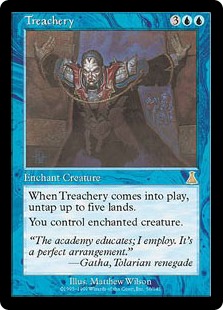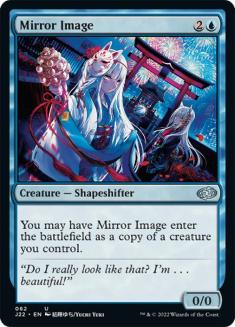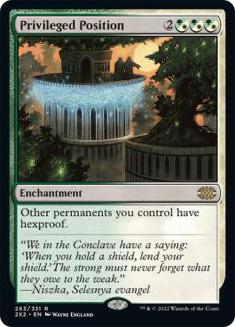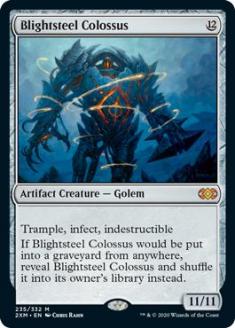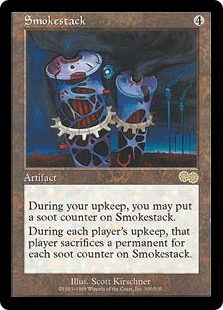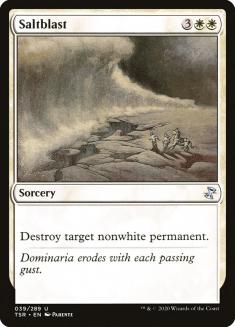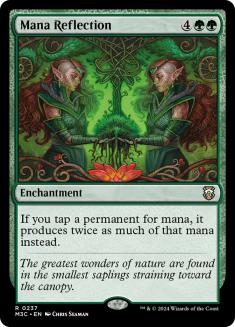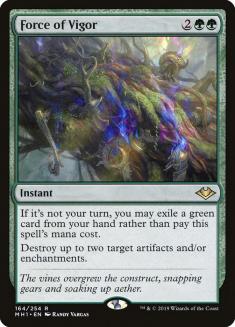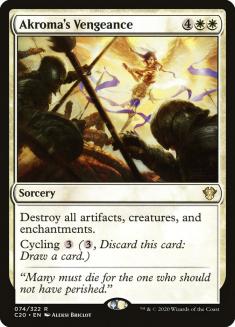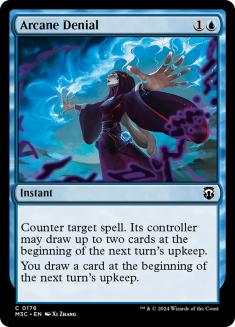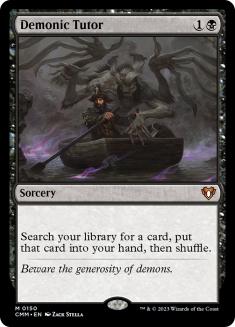Wow, was CommandFest Washington DC a total blast! Star City Games has been running excellent Commander events since the very first Commander Celebration at Grand Prix Atlanta some years back, but this was an entirely different vibe. Having an entire convention hall where just about everyone there was a fan of multiplayer Magic — wow! I was honored to be invited as a special guest and really loved getting to play against so many people I had never met before, as well as some friends I’ve seen regularly at the SCG CON Commander Celebration. I brought twelve different decks with me, and I’ll be sharing the latest decklists on Twitter over the next one or two weeks, so check over there if you want to see them.
Since Christmas is in a couple of days and the holiday season is all about the spirit of giving, I thought this would be a great time to talk about some things you can do for your opponents when you’re playing Commander. While the popularity of Commander has exploded in recent years with a lot of people loving how customized and personalized you can make your deck, I think it’s good to take a moment and think about the roots of Commander. Sheldon Menery and the Rules Committee have built this format to be a fun shared social environment, with the ultimate goal being that everyone walks away from each game with a smile on their face. One way to help accomplish that is to be mindful of your opponents’ experience when they play against you.
Below are some suggestions with that in mind:
Remember: just because you can play something, doesn’t mean you should.
If you’ve played competitive Magic for any length of time, you probably have built up some habits that don’t necessarily translate all that well to a casual game of Commander. Efficiency in how you use your mana is a big one, so if you’ve got mana and nothing else to do, the urge to use that mana to do something productive is strong. Say you have five mana open and a Shattering Pulse in your hand and an opponent has a Sol Ring on the battlefield and it’s the only artifact of note. Naturally, you’re going to want to cast Shattering Pulse with buyback to destroy it. But what if your opponent is stalled on lands and has been stuck on two for three or four turns? If you destroy their Sol Ring you’ve pretty much locked them out of playing the game for the foreseeable future. Is that really the sort of Commander game you want to play?
Here’s a real-world example. At an SCG CON a year or so back I was playing in a long, grindy game where we’d been playing for about an hour and each of us had been keeping the others in check without being able to really get ahead. One opponent had a Biovisionary on the battlefield, drew a card, and then cast Rite of Replication with kicker targeting it. I had open mana and a Mystic Snake in my hand, so I naturally cast the Snake to counter the spell.
The game kept limping along for another twenty minutes and we ended up just calling the game because an opponent had to leave. It occurred to me that countering that spell was just a really bad call, turning a game that could have ended in spectacularly fun fashion into something that ended a forgettable bore. Sure, I would have “let someone win” but honestly, we all would have won — they’d have won in a cool fashion, and all of us would have had those twenty minutes back to do something else.
When playing blue, consider playing cards that copy rather than cards that steal.
There’s no doubt that many of the blue cards that permanently steal a card from your opponent are efficient, powerful plays in Magic. In one card, you’re taking away a threat from an opponent and adding a threat of your own. But few things are as disheartening in a game of Magic than someone taking something of yours and then bashing you over the head with it, especially if it’s your own commander. I always encourage people to instead play copy effects like the many variants on Clone — that way, your opponent can be happy about casting their really cool monster, and you’re happy because you have one too.
Be open to interaction by weaning yourself off so much hexproof and shroud.
A few SCG CONs ago, Sheldon was asking people the question: if you could ban one card in Commander, what would it be? After a little thought, my answer was: Privileged Position.
Too many people get hung up on pushing through their gameplan by locking everyone out of being able to stop it. Playing so many cards like Privileged Position means forcing your opponents to have an immediate answer from their 100 card singleton deck and the resources to use it, or be forever helpless to do anything about it. Not only does this lead to bad game experiences, but it also forces lines of play that aren’t as fun — constantly holding up mana “just in case” rather than playing out cards to advance your own game.
I think a more generous approach is to instead invest more ways to recover your game plan if your opponents can answer it. That way, even if you ultimately execute your plan and win the game after several attempts, your opponents will have interacted along the way and played some Magic.
If someone ends the game with a combo, or with infect, or an “I win” card, it’s totally okay if everyone got to play Magic along the way.
I used to hate combo decks with a white-hot vengeance. I used to feel that “real” Magic was more about the ebb and flow of interaction and creature combat, and you should win games by taking each opponent down to zero the hard way. I thought that firing off a two- or three-card combo, or playing an “I win” card was basically cheating the spirit of the game.
But I’ve come around to feeling that, while playing a good interactive game of Magic is great, so is eventually ending it before everyone gets sick of it. The key of course is speed and consistency: if your deck consistently combo kills the entire table by Turn 4, you’re breaking the spirit of the format. But if everyone has time to play Magic, have some fun plays and interactions, it’s perfectly fine for the game to end in a timely fashion. I really do appreciate games that end in less than an hour because that means there might be time for another game.
So even if someone ends the game in a way you’d not prefer, if you’ve had time to play your deck and do some cool things along the way, congrats — you’ve checked off the goal of having fun!
Reconsider putting cards in your deck that lock opponents out of playing Magic.
Magic has a ton of competitive formats where locking your opponent out of playing Magic is a viable strategy for winning when “winning the game” is the only goal. Commander was designed to be more about a shared social experience where everyone is there to have fun.
Before adding cards or engines into your deck that will lock opponents out of playing the game if they don’t have the right answer, think about other ways you could have your deck play out.
Cut back on the salt — it spoils someone else’s fun.
Sometimes games can be unpleasant. Maybe you’ve stalled on your mana and your draws are terrible. Maybe someone got the perfect draw and they’ve jumped out to an impossible lead. Or maybe the kind of Commander game you were looking for doesn’t line up with the game one of your opponents has brought to the table.
It can be easy to get grumpy and upset about it; I know I’ve been guilty of feeling this way and making my displeasure known, which certainly sours the experience of everyone else. But we have ultimate control over how we react to unpleasant situations, so it’s good to realize that Magic in general has a high degree of variability, and with Commander in particular, with 100 cards and its singleton nature, that variability is even greater. Add to that the difficulty in evaluating your own deck’s power level and gameplay to a standard that aligns with others, and it’s inevitable that we shall have some games that we’d all rather forget.
So my recommendation is to just realize that sometimes, those games are going to happen. Try to sit back and instead be an observer of what everyone else has going on, and appreciate what the other players are doing. Cheer on other people’s plays even as you’re discarding to hand size yet again. And maybe try to see some humor in the situation; you might even be able to salvage a funny bad-beats story out of it.
A little less ramp, a little more interaction.
Nearly every good Commander deck has some measure of ramp spells, starting with Sol Ring, and it makes sense: oftentimes the most fun cards in your deck cost a good deal of mana, so being able to play them earlier is awesome. Also, you’ve got built-in mana sinks with commander tax so you have plenty of use for extra mana. But way too often I’ve seen people spend all of their early turns playing ramp spell after ramp spell after ramp spell — a cascade of artifacts and/or green sorceries. While getting to cast a spell a turn or two ahead of curve is fine when you’ve got a few opponents to keep you in check, having seven or eight mana available on Turn 3 is just obnoxious and can lead to games that just effectively end before anyone else gets to really do anything. Best case scenario, everyone else has to immediately start playing defensively, holding up mana to answer whatever ridiculous end-game you’re going to drop way ahead of schedule rather than playing the more proactive cards that they actually would rather be playing at that stage of the game.
So before you reach for that fifth or sixth mana rock, consider instead putting more creatures or answer cards that will encourage games that last a bit longer and be more fun for everyone.
Show some restraint on the number of sweeper spells.
Every once in a while I run across someone who loves playing control in tournament Magic who tries to build a control deck in Commander, and it’s a tough nut to crack. If you load your deck up with enough answer cards to keep control in a multiplayer game, you’re not left with much room to actually win the game. And here’s the rub — most opponents will have some number of answer cards, so even if you’ve got counterspell backup to protect your win condition, can you withstand two or three answers from your opponents? I vividly recall a game of Commander that lasted nearly two hours because the control player kept sweeping the battlefield to keep the rest of us from winning, yet didn’t have enough win conditions to punch through our own removal spells. We ended up just calling the game because we all had other things to do, and it was just a very unsatisfying end to two hours of gameplay.
So yes, play some number of sweeper spells; sometimes battlefields get too cluttered and someone who jumped out to a huge early start needs to be taken down a few pegs. But if you’ve got enough sweeper spells that nobody can even get any sort of presence on the battlefield, consider playing some more win conditions instead.
Be stingy on counterspells and hold them for hero moments.
Here are two scenarios where you have three counterspells in your hand.
- Scenario 1: You counterspell the first three spells one opponent plays, including their commander.
- Scenario 2: You counterspell someone’s early combo that’s going to immediately win the game, and then when they start a counter-war to push it through, you’ve got enough counterspells to win.
In the first scenario, you’re a heel. You look like a jerk and you’ve left someone with a real bad experience. In the second scenario, you’re the hero. Even the person who was trying to combo kill the table can’t be too mad because there was some interaction, and they’re still in the game.
Of course, the problem with Scenario 2 is the opportunity cost for holding up all that mana for a hero situation, which is why I recommend cutting back on the number of counterspells you run in favor of more interaction. There’s a reason why counterspells are hated but removal spells are acceptable. Even if something gets removed, at least you had the opportunity to cast the card and have it resolve.
But if you play blue, it’s fine to have a few counterspells to keep the combo players honest, and to have those hero moments where nothing else will save the day.
Be mindful if and when you use tutor cards.
It can be really boring to play against someone who runs a lot of cards that tutor for other cards. Two or three players have to sit and twiddle their thumbs while one person searches through their deck. Here are two big issues: either you’re going through your deck searching for one particular card, in which case you’ve got to carefully sift through your 99-card singleton deck to find it, or worse yet, you’re not even sure which particular card you want, in which case you’ve got to sift through and ponder your choices.
Either of these approaches takes time away from everyone else at the table. This is why I almost never play fetchlands like Wooded Foothills and prefer instead something that looks for basic lands like Fabled Passage. With a fetchland you typically are looking for one particular dual land in your entire deck, so that takes longer than finding a basic land.
Also consider if what you are tutoring for is something you’re going to go ahead and cast right now or not. If not, go ahead and pass the turn and let them know you’ll be resolving the tutor while they play on. If you’re searching up a land that you’re going to used to cast a spell, tell everyone what land you’re going to search for and then say you’re going to use it to cast the spell and go ahead and pass the turn while you search up the land.
And keep in mind one of the fun things of a singleton format is how different each game can be, even when playing the same deck. Playing a bunch of cards that tutor up other cards decreases the variability of game play and the excitement of the unknown. Instead of tutor effects I try to lean more heavily onto raw card drawing or card selection, which is typically much quicker to resolve.
So tell me, what sorts of things do you do when building or playing your deck out of consideration of your opponents’ enjoyment? I’d love to hear your thoughts!
Do me a solid and follow me on Twitter! I run polls and get conversations started about Commander all the time, so get in on the fun! I recently passed 2,000 followers and will be doing a pretty cool giveaway in the next few days as thanks, so keep an ear out!

